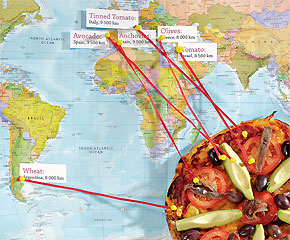What’s a pizza and salad got to do with all that? The answer is ‘food miles’. Consumers in Britain and Europe are increasingly aware of ‘food miles’, and how they contribute to the devastating effects of global climate change, but mention ‘food miles’ in South Africa, and it’s generally met with a blank look.
Quite simply, a ‘food mile’ is the distance food travels from the farmer who produces it to the consumer who eats it. It is estimated that the average meal in the US travels over 2 000km by truck, ship or plane before it reaches the dinner table.
What’s the connection?
There are no similar statistics available in SA, but given the amount of food we import and the big distances between cities and farms, it’s likely to be as high. And every litre of petrol, diesel or aviation fuel that is burned produces carbon dioxide, the greenhouse gas scientists blame for global warming.
While scientists have been warning governments about world climate change since the 1980s, it’s only in the past decade that governments are realising that climate change will affect not only the natural environment, but
people’s lives and the economy too.
Step out of the box
When faced with a massive problem like this, it’s often difficult to see what we can each do to help put things right. It’s hard to make the links between our own behaviour and global problems. Taking a closer look at the hidden kilometres in the food we eat is one way of doing so.
It’s worth stepping back and thinking about the origin of all the ingredients in a meal, and working out a ballpark figure for the distance your food has travelled, burning fossil fuel and emitting global-warming carbon dioxide all the way – and using this knowledge to make better choices about where and what you buy.
When we multiply our food miles by all the meals eaten daily by the planet’s six billion people, we get some understanding of the enormous amount of greenhouse gases that are pumped into the atmosphere every day, just by moving food around.
Are greenhouse gases all that bad?
Greenhouse gases, like carbon dioxide, are a good thing in small amounts. They allow the sun’s heat to enter the atmosphere, and then, acting like a giant blanket, trap some of the heat that is radiated off the earth, in so doing supporting life.
But because we have been burning enormous quantities of coal and oil since the 1800s, the amount of carbon dioxide in the atmosphere has increased so much that the ‘blanket’ effect is raising the average temperature of the planet.
You may have driven only a few kilometres to pick up your pizza and salad, but when you look at how far each ingredient has travelled, a very different, and scary, picture emerges.
Looking through the microscope
Let’s look a little closer at a pizza and salad meal eaten in Cape Town:
Wheat from Malmesburg (70km)and Argentina (8 000km)
Tinned tomato from Italy (9500km)
Olives from Italy (9500km)
Anchovies from Spain (9500km)
Pineapple from KwaZulu-Natal (1 750km)
Mushrooms from Gauteng (1 450km)
Mozzarella from Gauteng (1 450km)
Avo from Spain (9 500km)
Lettuce from Paarl (50km)
Onions from Free State (1 100km)
Fresh tomatoes from Israel (8500km)
Cucumber from Eastern Cape (850km)
Feta cheese from George (450km);
Olive oil from Spain (9500km)
Balsamic vinegar from Italy (9500km).
So your dinner’s ‘food miles’ go up to about 80697.
The distances shown do not take into account the kilometres that trucks and ships travelled to take fertilisers and fuel to the farmers, or the distance the milk travelled to the cheese factory, or the miles the fishing vessel sailed to catch the anchovies – each stage burning fuel.
So what can we do about it?
Well, the first and most obvious thing is to buy local food. If enough people support locally produced food, the local market will grow, which has positive spin-offs for our economy.
“We seem to just sit back and accept things. But I don’t think South Africa realise how powerful we could be if we all acted together,” says environmentalist Liane Greeff.

